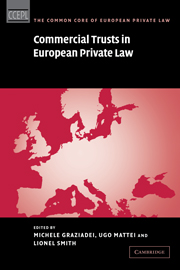Book contents
- Frontmatter
- Contents
- General editors' preface
- Preface
- Contributors to the volume
- Contributors to the case studies
- List of abbreviations
- Select bibliographies for jurisdictions represented
- Part I Setting the scene
- Part II The case studies
- Case 1 Creation and termination of the management relationship; powers of the manager
- Case 2 Investment duties
- Case 3 Conflict of interest
- Case 4 Basic insolvency situation
- Case 5 Insolvency of investment manager
- Case 6 Tracing
- Case 7 Choice of law
- Case 8 Pensions funds
- Case 9 Collective investment schemes
- Case 10 Multiple debenture holders
- Case 11 Securitisation
- Part III Conclusions
- Index
Case 2 - Investment duties
Published online by Cambridge University Press: 22 August 2009
- Frontmatter
- Contents
- General editors' preface
- Preface
- Contributors to the volume
- Contributors to the case studies
- List of abbreviations
- Select bibliographies for jurisdictions represented
- Part I Setting the scene
- Part II The case studies
- Case 1 Creation and termination of the management relationship; powers of the manager
- Case 2 Investment duties
- Case 3 Conflict of interest
- Case 4 Basic insolvency situation
- Case 5 Insolvency of investment manager
- Case 6 Tracing
- Case 7 Choice of law
- Case 8 Pensions funds
- Case 9 Collective investment schemes
- Case 10 Multiple debenture holders
- Case 11 Securitisation
- Part III Conclusions
- Index
Summary
Case
John is a professional investment manager. Sam decides to make use of John's services after learning that he is a skilful manager. In John's office, Sam signs a document granting John full investment powers over a capital value of €2,000,000. The terms of the document indicate that John's powers are to be irrevocable for the term of five years. These powers enable John, inter alia, to buy and sell any kind of asset, including immovables. The document also provides that John will credit all the income produced by the managed capital to Sam's bank account. It stipulates that John will be entitled to deduct an annual fee, calculated as a percentage of the capital value of the managed assets. Sam then writes a cheque payable to John for €2,000,000.
Alternative 1
In the second year of their relationship, Sam learns that John has made very risky investments that have done poorly. As a result, he has lost 50 per cent of the value of the capital. Does Sam have any legal recourse?
Alternative 2
In the second year of their relationship, Sam learns that John does not use his own judgement to make any of the investment decisions. Instead John relies exclusively on the recommendations in a well-known monthly financial newsletter. Does Sam have any legal recourse?
Discussion
AUSTRIA
Alternative 1
The contract between John and Sam is to be qualified as a contract of mandate in accordance with ss. 1002 ff. ABGB.
- Type
- Chapter
- Information
- Commercial Trusts in European Private Law , pp. 218 - 246Publisher: Cambridge University PressPrint publication year: 2005

